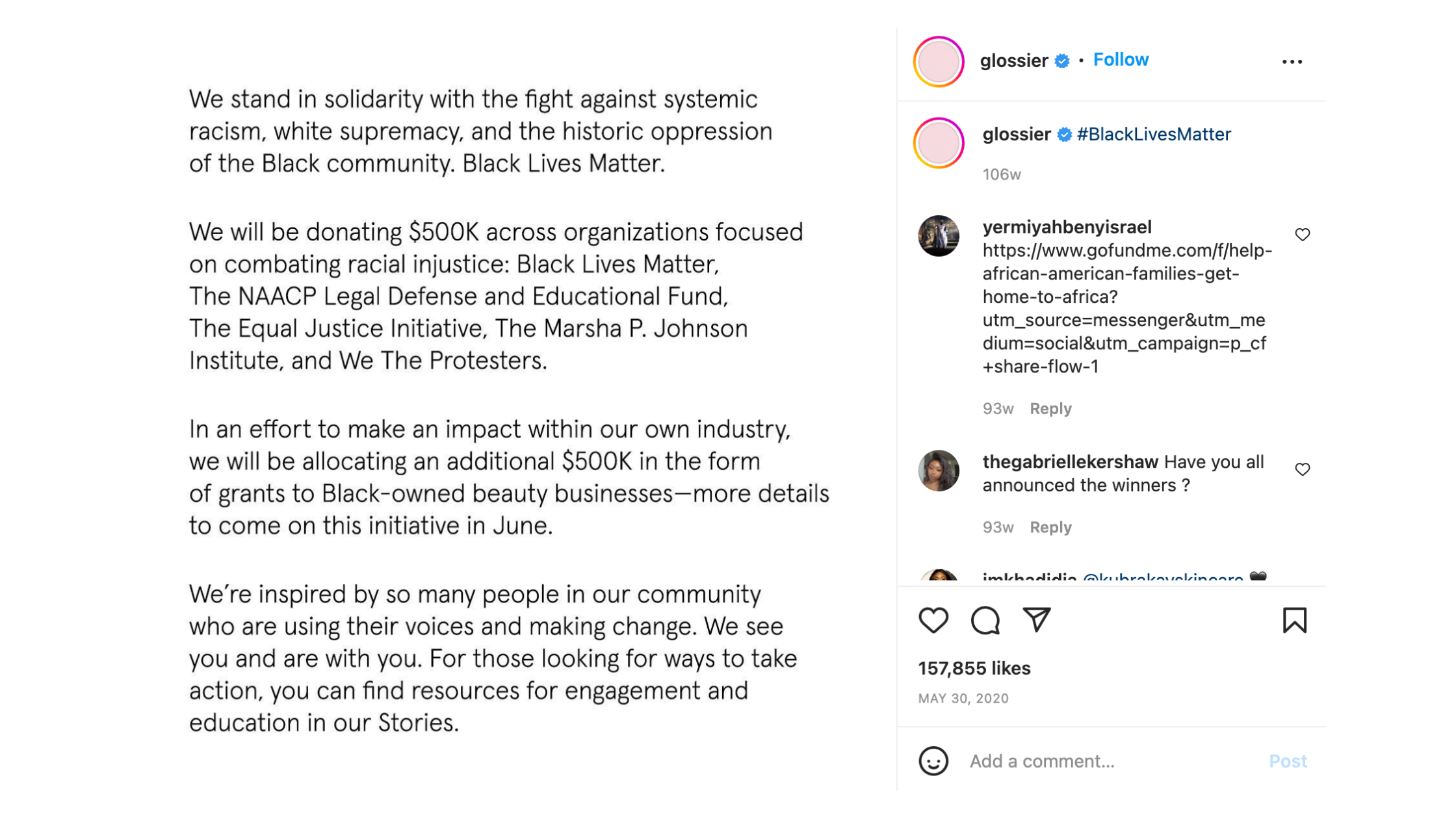We’re not here to debate it: your brand cannot afford to stay silent on social issues.
For decades, businesses have considered themselves separate from politics (which is often far from true in the first place). From small businesses to large corporations, marketing teams did not want to ruffle any feathers.
But, times have changed.
In today’s world, every topic is polarizing. And as online shopping and consumer behavior shift dramatically, brands are expected to take a stand. We’re rounding up x reasons why your brand can’t afford to stay silent on social issues and how your brand can do better.
Silence is complicity
According to a study done by Sprout Social, 70% of consumers surveyed believe it’s important for brands to take a stand on social and political issues. In that same survey, more than 60% thought brands had the power to reach large audiences and create real change.
Brands are not just expected to be a part of these conversations; some actually wield the power to shape society and change the outcome.
After all, when it comes to issues of morality and human rights, silence is complicity. The refusal to speak out and take action against a flawed system is what keeps that system in place.
Educate yourself thoroughly before making a statement
Speaking out on social issues is divisive; no one is denying that. However, no message is also a message, and it’s important to educate yourself on who you are harming and what your impact is when you stay silent.
Although not every issue demands a response from your brand, some issues go beyond the topical relevance. For instance, we all have a role to play in speaking out against discrimination and human rights.
As a brand, your customers, employees, partners, and stakeholders are all directly impacted by issues like systemic racism. If you feel it is better to stay silent or “keep business separate from politics,” it might be time to turn inwards and ask yourself if you might be a part of the problem.
On the other hand, when it comes to current events such as global conflict, you may choose to share resources or show support online, without necessarily making an official statement.
For instance, at the start of the Russian-Ukraine war, social media and the news cycles were overwhelmed with news and updates. We recommended that our clients pause their regular social media posts and delay any promotions campaigns until the cycle died down.
On top of this, some clients chose to make a statement, some simply shared resources from others online, and some remained silent – it depended on what we saw going on with their unique audience of customers.
Do your due diligence and learn what you can before making a decision.

Consumers are becoming more socially responsible
The future of commerce and marketing is determined by generations. Each generation has a distinct set of defining world events, values and ethics, buying behavior, and more. These differences are key, particularly as one generation “ages in” to make up a larger portion of the consumer market.
Millennials set the stage with a focus on diversity and multiculturalism and a higher expectation of brands and corporations. Now, we’re seeing Gen Z completely lean into these values.
Consumers today look beyond the tangible product. They want to shop from brands that align with their values. They ask questions like:
- What’s this brand’s mission?
- What is this brand actually trying to build for us as a society?
- Are these goods ethically sourced, manufactured, and marketed?
- Will this purchase make me feel guilty?
With this in mind, it not only pays off to speak up on social issues as a brand but also allows you to actively build a loyal customer base.
However, don’t overestimate the power of speaking up. Making a statement as a brand is important, but it’s the bare minimum. Your customers will keep a watchful eye on you to know how you are planning to commit to your stance.
Know the line between performative statements and genuine support
When it comes to social issues, don’t forget to actually walk the talk. During the Black Lives Matter protests of 2020, many brands wrote up solemn, vague black-and-white statements in support of the cause.
However, few actually called out a bad actor. Few actually wrote out the words “Black Lives Matter”. These slippery statements speak volumes to stakeholders, especially Black stakeholders.
The Harvard Business Review calls it “woke-washing.” Others call it “Black Power-washing.” Really, it’s just a thinly veiled performance for the sake of maintaining an image.
The Atlantic describes this as a practice “wherein companies issue essentially meaningless statements about their commitment to Black folks but do little to change their policies, hiring practices, or ultimately their business models, no matter how harmful to Black people these may be.”
Your employees, colleagues, customers, and partners will be able to identify which brands are really in it versus which ones are trying to save face.
Genuine support means taking the time to consider how you can make a positive change, rather than simply “committing to do the work.” Specificity is key.
A great example of a well-thought-out statement is from Glossier. The brand outlined which organizations they were donating to as well as the exact amount. Then, they went on to also specify how they intended to make an impact in their industry.

Understandably, you can’t make a massive donation for every social issue that comes up. Still, there are important ways to make a difference without opening your wallet. For example, be a part of the ongoing dialogue.
Oftentimes, brands are so worried about how they look to others on the outside that they neglect to provide support on the inside.
When it comes to social issues like targeted racism or gun violence in schools, understand that both your team members and customers are hurting.
Hold space for your team to talk about what’s going on. Leaving these conversations to happen outside of your workplace signals to your employees that your company is not a safe space to tackle such important issues.
Remember: in these moments, no one has to be an expert. While bringing on experts for professional training sessions can go a long way, sometimes all your team needs is for someone to ask how they are doing – and actually listen.
Business and politics are not separate
For a long time – particularly pre-pandemic – businesses and corporations were seen simply as cogs in a capitalist machine, existing purely for economic purposes. However, as brands continue to play an active role in shaping society and changing perceptions, this is no longer true.
In fact, staying silent ignores the cultural conversations happening around your brand. By extension, you are not acknowledging the reality in which your employees, customers, investors, and community are living.
For many brands, this begs the question: which issues should I be speaking up for?
Identify which social issues to speak out on as a brand
Certain social issues are more relevant for some brands than others. For example, if you work in the health and wellness space, directly addressing the pandemic might make more sense for you than say, a brand in the fashion industry.
Relevance matters because it allows you to step up to the plate when it is important to your company’s audience.
Think about whether or not your stakeholders think the issue is important or expect you to respond. Then, assess how you can make a statement in alignment with your company’s culture.
Additionally, be careful of making a meaningless statement. For instance, Martin Luther King Day has become a holiday where brands reuse some overly branded posts and say something generic about MLK. Meanwhile, Dr. King’s legacy goes so far beyond the one or two quotes you typically see on Instagram.
As a brand, consider whether or not you can actually add something meaningful to all the noise about an issue. The prime example of this is Ben & Jerry’s:
View this post on Instagram
Let your brand be on the right side of history
At the end of the day, current events and social justice movements are no longer just history book chapters about individuals and political parties. When you can document these issues in real-time from your back pocket, you’ll find that history books will start to mention normal people and stand-out brands that chose to make a difference.
Speak out. Don’t sit on the sidelines. Let your brand be on the right side of history. Get in touch with our team to have marketing professionals handle your digital strategy when it comes to speaking out on social issues.
